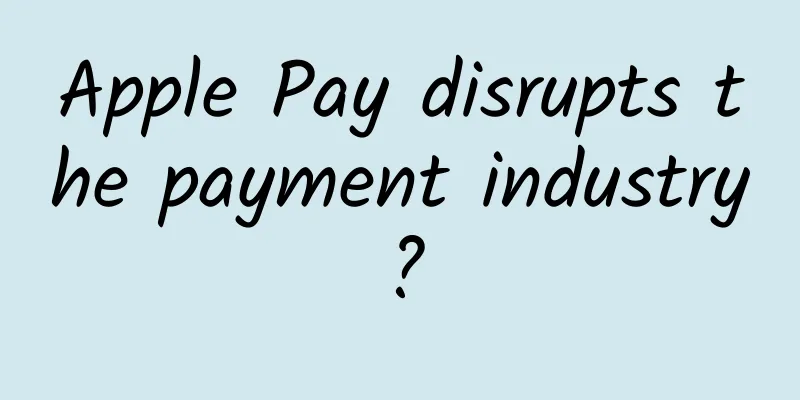Apple Pay disrupts the payment industry?

|
A recent market research report shows that Apple Pay has gained 1.7% of the market share only one and a half months after its launch. Those who watched Apple's annual new product launch conference and clamored that Apple Pay would subvert the payment industry have new rhetoric. But in fact, those who can say "Apple Pay subverts the payment industry" may have little understanding of finance and Internet finance, let alone the segmented payment industry. This is because Apple Pay has not disrupted the payment industry, and it has not been able to disrupt any visible competitors. In fact, if "disruption" is used to evaluate the success of Apple Pay, then it is a failed product. Why? Apple Pay — A great form factor innovation, nothing more The most intuitive innovation of Apple Pay is that it can use Touch ID to verify on iPhone 6 and iPhone 6 Plus, which can bring great convenience to users. Users do not need to verify via SMS or enter passwords, which are more cumbersome verification methods on mobile devices, and can complete the payment process more quickly. TouchID verification covers both offline and online payment scenarios of Apple Pay. In the future, when Apple Watch is officially launched, it will also bring a more convenient experience to offline mobile payments. But this is not proof that Apple Pay has disrupted anyone. The biggest highlight of Apple Pay is that it was created by the world's most valuable lifestyle company and, relying on Apple's market position, has become a great form of innovation in the payment industry, nothing more .
Apple Pay has subverted the payment password through TouchID - this may be the only subversion it has completed so far. It replaces the password encryption layer with fingerprints, adding a password-free process based on the local chip's non-network security mechanism. However, there are many such so-called "disruptions", but they are not as dazzling as Apple Pay after being given the halo by Apple and TouchID. These products and companies that have made little efforts in security verification methods to improve user experience are worth remembering, such as gesture unlocking used by WeChat and Alipay, voiceprint payment of Alipay, and facial recognition in cooperation with Face++. It is not ruled out that hardware will support iris scanning payment verification in the future - fingerprint, gesture, iris, voiceprint, facial recognition, these are just encryption layers. It can only be said that the new verification method has brought form innovation to mobile payment, and talking about subversion is simply a joke. Apple Pay still needs traditional payment clearing backend service support Payments made by users through Apple Pay do not flow directly into Apple's pocket, because Apple Pay still needs the support of many partners in the payment business chain. Like Square, Alipay, and WeChat Pay, Apple Pay is just a mobile Internet terminal payment product, an intuitive way for users to make payments. Under the skin of all Internet payment products, the entire payment and clearing industry has three major levels, which are ranked from the closest to the terminal products: payment gateways, acquiring service providers, and banks/card organizations . 1. Payment gateway : In simple terms, the payment behavior of users on the Internet needs to be converted into financial data that can be recognized by the servers of financial institutions, and the payment gateway does this. At this level, there are many very popular so-called "mobile payment startups", such as the popular Stripe and Authorize.Net acquired by Visa. 2. Acquiring service providers : When users swipe their cards or Apple Pay at merchants, acquiring service providers are responsible for settling these funds to merchants within a specified period and charging a certain percentage of the handling fee. In China, acquiring services are usually completed directly by banks, but in the United States, as the Internet promotes financial innovation, banks have basically withdrawn from acquiring services. The most well-known acquiring service provider is First Data. 3. Banks and card organizations : There is no need to introduce this in detail. Apple Pay purchases are completed by swiping the phone/fingerprint verification, but the funds still come from bank cards issued by the bank, and the bank needs to comply with the protocols and standards specified by the card organization when issuing the card. Such card organizations are UnionPay in China (there are rumors that the world's largest bank, Industrial and Commercial Bank of China, may become the second card organization after UnionPay), and Visa, MasterCard, American Express, etc. in the United States. On the Apple Pay developer support page, we can clearly see that if developers want to add Apple Pay functionality to their apps, they need to do some necessary preparation, including “selecting a payment platform.” So, who are the payment platforms that Apple Pay needs? There are acquiring monopolies like First Data, Chase (which provides acquiring and gateway services), new payment gateway companies like Stripe, well-known payment service startups like Braintree, and Authorize.Net, which has been acquired by Visa.
It can be seen that among these partners, there are acquirers and gateways, including both startups and financial giants such as Visa and Chase. Some professionals have pointed out that Apple Pay is not a product that will disrupt the payment industry, because in a country like the United States where the financial industry is highly developed and Internet-based, Apple can hardly and does not need to launch its own payment gateway and acquirer business. The reality is that although terminal payment products including Square, PayPal, and Apple Pay have a certain degree of extension in this payment and clearing business chain, they can only disrupt the link they are in, that is, the terminal payment product itself. The reason why Apple Pay cannot shake up the payment industry is that it cannot shake the position of traditional card organizations and banks. In the European and American markets, led by the United States, consumers are accustomed to pre-consumption, so the use of credit cards has become very convenient. The entire system is very mature, and card issuers and card organizations have these consumption data, which means they can master the consumption habits of the entire country. The most important thing is that these traditional organizations with high status are highly open to innovation while developing and maturing : they are willing to open their downstream business chains to so-called startups such as Stripe and Braintree. You can also understand this as a reasonable layout: if I transfer the benefits well, no one will eventually stand up and say they want to subvert this business chain, which would be too difficult. This is also why PayPal has achieved 70% to 80% of the market share and has no chance to achieve new achievements. Back to Apple Pay, which now has less than 2% market share: Apple Pay was born in such a mature financial market system, which means it is doomed to fail to subvert the payment industry. To put it in a way that is no longer surprising to everyone: If Steve Jobs were still alive, he would never allow Apple Pay to exist with such a lack of subversion. In other words, Apple Pay is not as prestigious as you think, and the reason why it is welcomed by traditional banks and financial institutions is simple: the openness of the US financial system and the popularity of the iPhone. Does Apple Pay still have a chance to disrupt the payment industry? At this point, we can only regret that Apple Pay was not born in China. Otherwise, it might have been as successful as Alipay in the payment industry. Why has Internet finance, especially the concept of mobile payment, suddenly caused a turbulent wave in China's financial industry in the past two years? In contrast to the United States mentioned above, the rise of Alipay (and WeChat Pay) in China is precisely due to the backwardness of the banking system. The reason behind this can be understood as follows: China UnionPay is currently the only giant in the card organization, and it cannot understand the innovative requirements stimulated by multiple card organizations in the United States in oligopoly competition. The reason is simple. Without competition, there is no pressure. Without pressure, there is no enterprising spirit. UnionPay was busy formulating payment standards and vigorously promoting NFC mobile payment standards. It came up with UnionPay QuickPass, but no one paid attention. People who are familiar or unfamiliar with the mobile payment industry have probably seen the current situation. Especially in the Double 12 event of 2014, Alipay and WeChat Pay once again staged the drama of Yu'ebao and red envelopes popularizing the concept of Internet finance last year. Now when talking about offline payment, almost no one will mention UnionPay. Even most people have almost forgotten who Lakala is. Everyone is discussing Alipay and WeChat Pay.
Let me digress: the ambiguous exchanges between Apple CEO Tim Cook and Alibaba Chairman Jack Ma at the D.Conference made many so-called industry observers feel like their G-spots were touched, and they began to shout that Apple Pay was subverting the payment market - this is not the case at all. As a terminal payment product, Apple Pay is at the same level as Alipay, and to put it bluntly, they are competitors. Do people still expect Alipay and Apple to share profits in China? The aftermath of this is that Alipay is also working on its own acquiring and gateway business. Ant Financial now has a secondary market valuation similar to Alibaba’s main market value, but it cannot be listed in the United States due to its business license. Because the market is too large, the domestic market may not have such a large amount of funds, and it may be difficult to be listed in China. In the future, Alipay may reduce its dependence on banks and UnionPay, and may become a super bank, not to mention its dependence on Apple Pay - TouchID is not only open to Apple Pay. Why are Cook and Jack Ma flirting? The correct answer to this question is: When it comes to the end of the year when performance is due, everyone needs to flirt a little to boost the stock price... Back to the topic. Considering the fear of traditional domestic financial institutions towards Alipay and WeChat Pay, it is very likely that they will open their arms to Apple Pay. Sources pointed out that the cooperation negotiations between UnionPay and Apple have entered the final stage, and Apple Pay will have many actions with UnionPay next year. But after all, Apple is a foreign company. It can cooperate with UnionPay on the product level, but it is almost impossible to cooperate with UnionPay on the acquiring and payment gateway business under the current political and economic environment. In summary, it is too difficult for Apple Pay to disrupt the payment industry. No matter which market it enters, cooperating with existing upstream and downstream chains is the best option. Jin Yiye ( Ping++ CEO) made significant contributions to this article |
<<: Cocos 2d-x 3.3 version upgrade improves 3D quality in five dimensions
>>: 33 data points on Apple in 2014
Recommend
Sony's revival depends on game consoles
Sony recently announced that its PlayStation 4 vi...
Mistakenly thought it was a cold, and almost lost my life! Don’t ignore these situations...
Have you ever had this experience when you had a ...
Tik Tok live broadcast room FEED stream promotion marketing strategy
one. Merchant access requirements 1. Selling good...
Baidu, Massive Engine, Guangdiantong, Massive Qianchuan 4 major channel promotion skills
People often ask, which channel is most effective...
At the moment of Tianzhou launch, let’s see which “delivery guy” has the coolest soaring pose?
May 10 Tianzhou-4 cargo spacecraft rushes into sp...
Five major mobile application development trends, is your app going astray?
Developers cannot ignore mobile app development i...
The grayscale mask of the post-production technique course of Liangzhijuku Photography, advanced adjustment techniques in the post-production field of landscape photography
The grayscale mask of the post-production techniq...
How to set up discounts for marketing activities?
It’s the end of the year now, are all the marketi...
How to operate a new product?
This problem is universal, and I believe every op...
How can online education attract new customers, retain customers, and convert them?
Walnut Programming is one of the online education...
[Recommended blog post] Real-time rendering of seawater on Unity3D mobile terminal
This blog post is from 51CTO blogger jxw167. If y...
Game live streaming platform: Huya Live Development Analysis
The author of this article analyzes the main func...
In order to compete with Ideal L6 for the market, Avita 07 Pro+ not only increases its configuration but also reduces its price by another 20,000 yuan. Is this enough?
Price reduction may be one link in the sales comp...
Musk claims Tesla batteries are 100% recyclable, but experts refute it; electric vehicles still pose environmental risks
Whether electric cars are more environmentally fr...
A female Trump appeared in France and wanted to force the car companies to return to their factories
According to foreign media reports recently, Fren...









